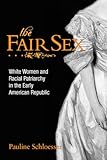The Fair Sex : White Women and Racial Patriarchy in the Early American Republic / Pauline E. Schloesser.
Material type: TextPublisher: New York, NY : New York University Press, [2005]Copyright date: ©2005Description: 1 online resourceContent type:
TextPublisher: New York, NY : New York University Press, [2005]Copyright date: ©2005Description: 1 online resourceContent type: - 9780814797631
- 9780814739976
- 305.42/0973/09033
- online - DeGruyter
| Item type | Current library | Call number | URL | Status | Notes | Barcode | |
|---|---|---|---|---|---|---|---|
 eBook
eBook
|
Biblioteca "Angelicum" Pont. Univ. S.Tommaso d'Aquino Nuvola online | online - DeGruyter (Browse shelf(Opens below)) | Online access | Not for loan (Accesso limitato) | Accesso per gli utenti autorizzati / Access for authorized users | (dgr)9780814739976 |
Browsing Biblioteca "Angelicum" Pont. Univ. S.Tommaso d'Aquino shelves, Shelving location: Nuvola online Close shelf browser (Hides shelf browser)

|

|

|

|

|

|

|
||
| online - DeGruyter Running for Judge : The Rising Political, Financial, and Legal Stakes of Judicial Elections / | online - DeGruyter Saving Our Children from the First Amendment / | online - DeGruyter Is Academic Feminism Dead? : Theory in Practice / | online - DeGruyter The Fair Sex : White Women and Racial Patriarchy in the Early American Republic / | online - DeGruyter Changing Faith : The Dynamics and Consequences of Americans' Shifting Religious Identities / | online - DeGruyter Jacques Lacan's Return to Freud : The Real, the Symbolic, and the Imaginary / | online - DeGruyter Love the Sin : Sexual Regulation and the Limits of Religious Tolerance / |
restricted access online access with authorization star
http://purl.org/coar/access_right/c_16ec
Choice Outstanding Academic Title 2002 Once the egalitarian passions of the American Revolution had dimmed, the new nation settled into a conservative period that saw the legal and social subordination of women and non-white men. Among the Founders who brought the fledgling government into being were those who sought to establish order through the reconstruction of racial and gender hierarchies. In this effort they enlisted "the fair sex,"&#-white women. Politicians, ministers, writers, husbands, fathers and brothers entreated Anglo-American women to assume responsibility for the nation's virtue. Thus, although disfranchised, they served an important national function, that of civilizing non-citizen. They were encouraged to consider themselves the moral and intellectual superiors to non-whites, unruly men, and children. These white women were empowered by race and ethnicity, and class, but limited by gender. And in seeking to maintain their advantages, they helped perpetuate the system of racial domination by refusing to support the liberation of others from literal slavery. Schloesser examines the lives and writings of three female political intellectuals-;Mercy Otis Warren, Abigail Smith Adams, and Judith Sargent Murray-;each of whom was acutely aware of their tenuous position in the founding era of the republic. Carefully negotiating the gender and racial hierarchies of the nation, they at varying times asserted their rights and demurred to male governance. In their public and private actions they represented the paradigm of racial patriarchy at its most complex and its most conflicted.
Mode of access: Internet via World Wide Web.
In English.
Description based on online resource; title from PDF title page (publisher's Web site, viewed 01. Nov 2023)


